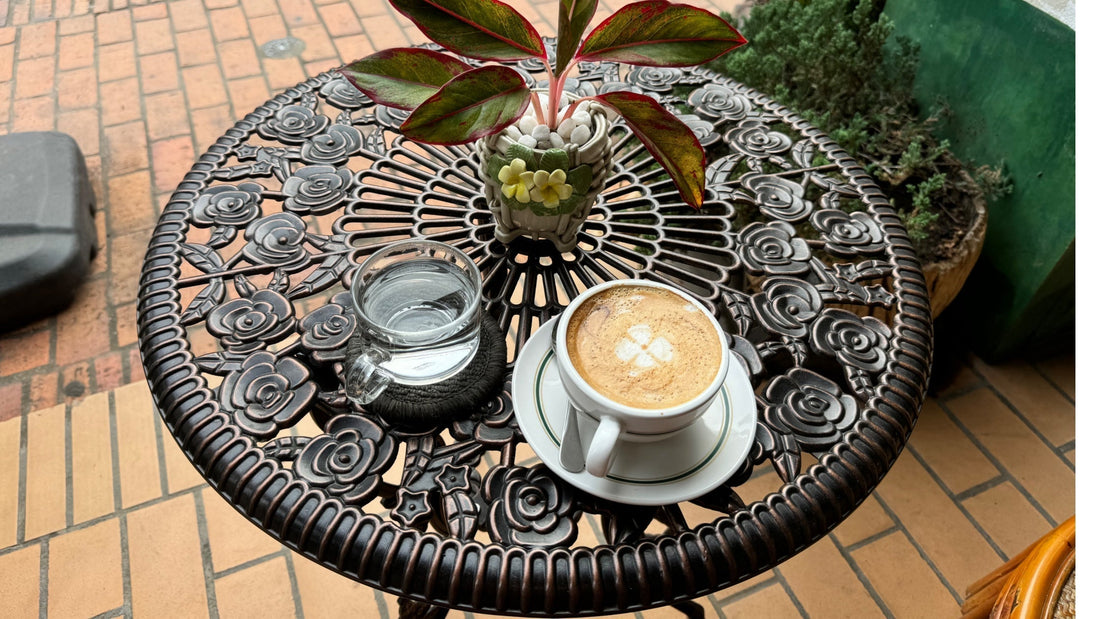
Lao Coffee Culture | Starbucks, Cafe Amazon, and Sinouk Coffee Shop
We ended 2024 back in Laos, exploring the country's coffee culture and returning to Grandpa's land to see what premium crafts we could source for our customers. We notice with the recent development in Laos, big coffee houses like Starbucks have set foot in major cities in Laos. This may bring in a new, refreshing influence to the Laotian coffee culture. In the past, our Grandpa grew his own coffee beans, and we often saw the traditional method of the sock drip brewing technique.
Laos coffee culture is a fascinating blend of traditional practices and modern influences, deeply rooted in the country's agricultural heritage. Coffee was first introduced to Laos in the 19th century by French colonizers. The ideal climate in the volcanic, soil-rich highlands makes it a prime location for coffee cultivation. Today, Laos is known for producing high-quality Arabica and Robusta beans, especially in regions like Bolaven Plateau.
One of the distinctive aspects of Laotian coffee culture is the way coffee is often prepared and consumed. Traditional Laotian coffee is typically brewed using a drip filter method, resulting in a robust brew. Locals often enjoy their coffee sweetened with condensed milk, which adds a rich and creamy texture that complements the robust flavors. This preparation is reminiscent of the coffee styles found in neighboring Vietnam, but with its unique touch.
In urban areas, particularly in Vientiane and Luang Prabang, there has been a noticeable rise in coffee shops and cafes, many of which blend traditional Laotian practices with contemporary café culture. These establishments not only serve as places to enjoy a cup of coffee but also as social hubs where people gather to relax and connect. The recent arrival of international chains like Starbucks has also influenced the coffee scene, introducing new brewing techniques and beverage options to the local market.
Beyond consumption, coffee plays an essential role in the livelihoods of many Laotians. Coffee farming provides crucial employment and income opportunities for rural communities. Sustainable and organic coffee farming practices are gaining popularity, as farmers strive to meet international quality standards while adopting environmentally friendly agricultural techniques.
Laos also takes pride in its artisanal coffee products, with local farmers and cooperatives promoting premium, hand-picked beans that are often exported for their quality. Tourists seeking a genuine taste of Lao culture can visit coffee plantations, where they can participate in tastings and learn about the journey from bean to cup.
Overall, the coffee culture in Laos is an intriguing mix of tradition and modernity, reflecting the country’s rich agricultural heritage and its evolving relationship with global coffee trends. Whether enjoyed in a bustling café or at a family gathering, coffee in Laos continues to foster community and connection.
Share this
Related Posts
-

How Laotians and Southeast Asians keep cool in a heat wave during the summer time
Southeast Asia, which includes Laos, Thailand, Cambodia, Indonesia, and Malaysia, is known for its tropical climate...
-

Scraping the Wind Coining Gua Sha Massage Therapy in Laos
Gua sha massage therapy is a traditional form of massage therapy that has been practiced for centuries in many parts ...

